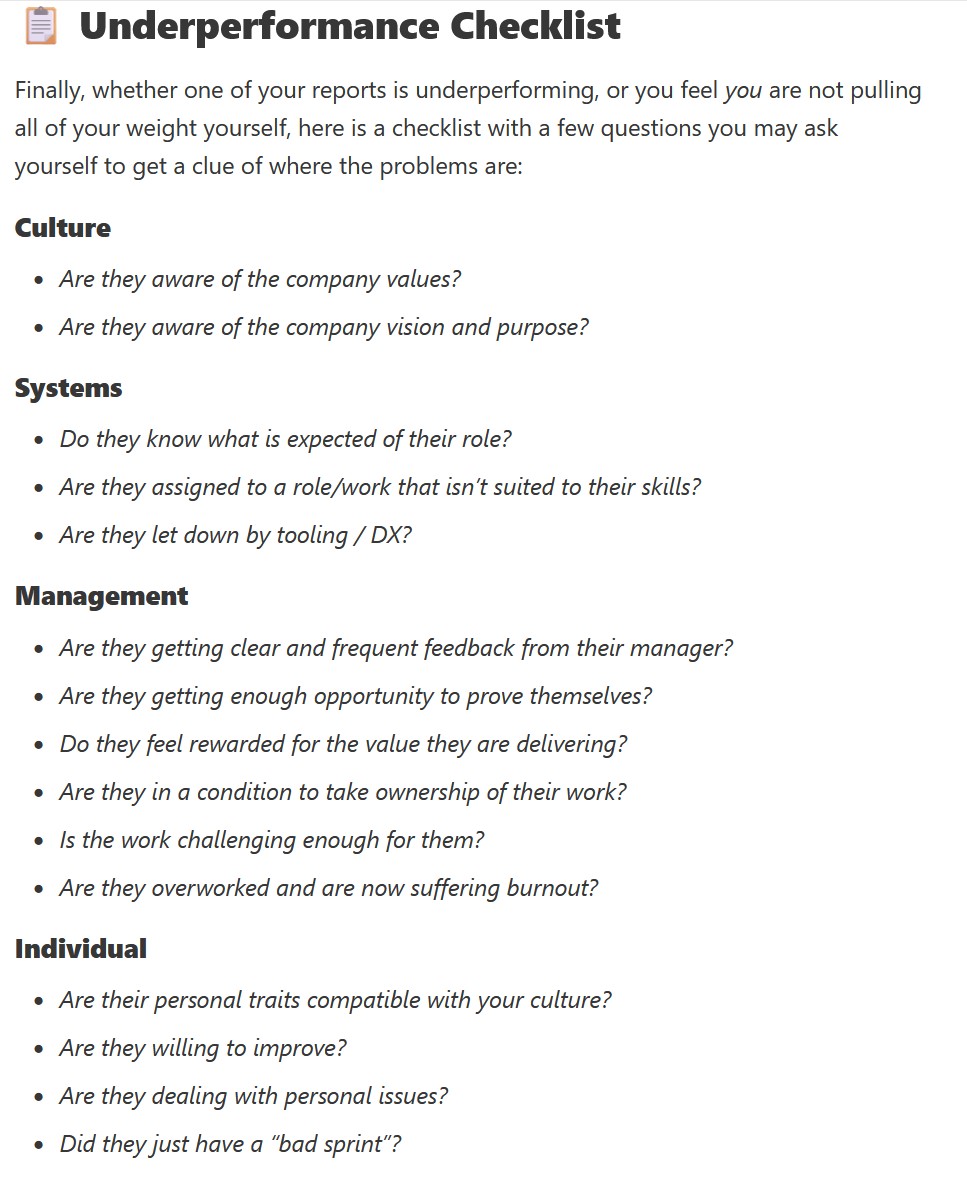-
Luca Rossi – How to Help Underperformers
https://hybridhacker.email/p/how-to-help-underperformers
- Understand Performance is Systemic: Recognize that culture, systems, management, and individual traits impact performance.
- Address Underperformance Early: Use consistent feedback and the accountability dial (mention, invitation, conversation, boundary, limit).
- Provide Balanced Feedback: Reinforce, acknowledge, and correct behaviors.
- Use an Underperformance Checklist: Evaluate issues related to culture, systems, management, and individual traits.

-
Suite Platinum Medley cover by Diego Cebrián
Bonus: Mike Oldfield MEDLEY (Amarok|Ommadawn|TubularBells)
Diego Cebrián & Alejandro Sotomayor -
GoldmanSachs.com – GEN AI: TOO MUCH SPEND, TOO LITTLE BENEFIT?
Tech giants and beyond are set to spend over $1tn on AI capex in coming years, with so far little to show for it. So, will this large spend ever pay off? MIT’s Daron Acemoglu and GS’ Jim Covello are skeptical, with Acemoglu seeing only limited US economic upside from AI over the next decade and Covello arguing that the technology isn’t designed to solve the complex problems that would justify the costs, which may not decline as many expect. But GS’ Joseph Briggs, Kash Rangan, and Eric Sheridan remain more optimistic about AI’s economic potential and its ability to ultimately generate returns beyond the current “picks and shovels” phase, even if AI’s “killer application” has yet to emerge. And even if it does, we explore whether the current chips shortage (with GS’ Toshiya Hari) and looming power shortage (with Cloverleaf Infrastructure’s Brian Janous) will constrain AI growth. But despite these concerns and constraints, we still see room for the AI theme to run, either because AI starts to deliver on its promise, or because bubbles take a long time to burst.
Local copy below
-
Pallaidium – a free and open source genAI movie studio integrated into the free Blender video editor
https://github.com/tin2tin/Pallaidium/
Features
Text to video Text to audio Text to speech Text to image Image to image Image to video Video to video Image to text ControlNet OpenPose ADetailer IP Adapter Face/Style Canny Illusion Multiple LoRAs Segmind distilled SDXL Seed Quality steps Frames Word power Style selector Strip power Batch conversion Batch refinement of images. Batch upscale & refinement of movies. Model card selector. Render-to-path selector. Render finished notification. Model Cards One-click install and uninstall dependencies. User-defined file path for generated files. Seed and prompt added to strip name. -
59 AI Filmmaking Tools For Your Workflow
https://curiousrefuge.com/blog/ai-filmmaking-tools-for-filmmakers
- Runway
- PikaLabs
- Pixverse (free)
- Haiper (free)
- Moonvalley (free)
- Morph Studio (free)
- SORA
- Google Veo
- Stable Video Diffusion (free)
- Leonardo
- Krea
- Kaiber
- Letz.AI
- Midjourney
- Ideogram
- DALL-E
- Firefly
- Stable Diffusion
- Google Imagen 3
- Polycam
- LTX Studio
- Simulon
- Elevenlabs
- Auphonic
- Adobe Enhance
- Adobe’s AI Rotoscoping
- Adobe Photoshop Generative Fill
- Canva Magic Brush
- Akool
- Topaz Labs
- Magnific.AI
- FreePik
- BigJPG
- LeiaPix
- Move AI
- Mootion
- Heygen
- Synthesia
- Chat GPT-4
- Claude 3
- Nolan AI
- Google Gemini
- Meta Llama 3
- Suno
- Udio
- Stable Audio
- Soundful
- Google MusicML
- Viggle
- SyncLabs
- Lalamu
- LensGo
- D-ID
- WonderStudio
- Cuebric
- Blockade Labs
- Chat GPT-4o
- Luma Dream Machine
- Pallaidium (free)
-
Nike by Phil Schiller – The job is not done until the job is done
- Our business is change.
- We’re on offense. All the time.
- Perfect results count — not a perfect process. Break the rules: fight the law.
- This is as much about battle as about business.
- Assume nothing. Make sure people keep their promises. Push yourselves push others. Stretch the possible.
- Live off the land.
- Your job isn’t done until the job is done.
- Dangers
Bureaucracy
Personal ambition
Energy takers vs. energy givers
Knowing our weaknesses
Don’t get too many things on the platter - It won’t be pretty.
- If we do the right things we’ll make money damn near automatic.
-
How Good Is ChatGPT at Coding, Really?
https://spectrum.ieee.org/chatgpt-for-coding
ChatGPT has not been exposed yet to new problems and solutions. It lacks the critical thinking skills of a human and can only address problems it has previously encountered. This could explain why it is so much better at addressing older coding problems than newer ones.
“ChatGPT may generate incorrect code because it does not understand the meaning of algorithm problems, thus, simple error feedback information is not enough,”
-
Inside the Health Crisis of a Texas Bitcoin Town
https://time.com/6982015/bitcoin-mining-texas-health
This study explores the adverse effects of a Bitcoin mining facility on the health and environment of Granbury, Texas. Residents report significant disturbances due to noise pollution, resulting in sever vascular circulatory issues, migraines, sleep issues, and a decrease in local wildlife. Despite efforts to mitigate noise through sound barriers, the community continues to experience reduced quality of life. The rapid expansion of Bitcoin mining in Texas, driven by favorable political conditions, underscores the need for regulatory measures to balance economic benefits with community well-being.
COLLECTIONS
| Featured AI
| Design And Composition
| Explore posts
POPULAR SEARCHES
unreal | pipeline | virtual production | free | learn | photoshop | 360 | macro | google | nvidia | resolution | open source | hdri | real-time | photography basics | nuke
FEATURED POSTS
Social Links
DISCLAIMER – Links and images on this website may be protected by the respective owners’ copyright. All data submitted by users through this site shall be treated as freely available to share.




